REST IN POWER
Family ‘heartbroken’ following death of founding SDLP figure Austin Currie, a key figure in NI’s civil rights movement
Austin Currie, one of the founding members of the SDLP, has died at age 82.
THE NORTHERN IRELAND
SOCIAL DEMOCRATIC & LABOUR PARTY
By The Newsroom
Tuesday, 9th November 2021, 9:13 pm
Mr Currie, who was a key figure at the beginning of Northern Ireland’s civil rights movement, died at his home in Derrymullen, Co Kildare.
His family have said they are heartbroken at his death.
Mr Currie died in his sleep at his home in Derrymullen, Co Kildare, on Tuesday. He had recently celebrated his 82nd birthday
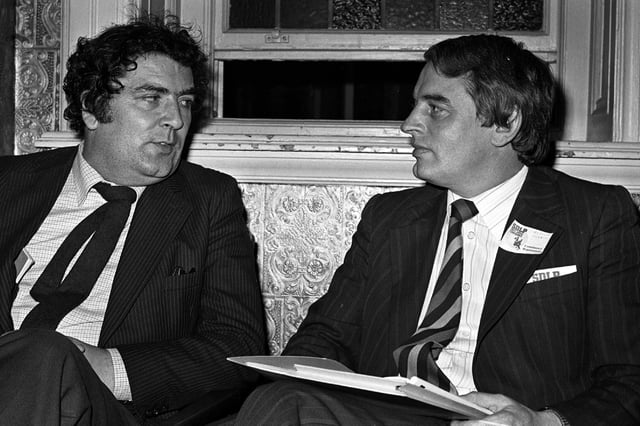
John Hume and Austin Currie talking at an SDLP Conference in Newcastle in 1980.
Photo: Pacemaker
A family statement said: “The Currie family is heartbroken to announce the death of Austin Currie.
“Austin was married to Annita for 53 years. They were a formidable team whose love for each other and their family saw them through some of the worst times in Northern Ireland’s recent history.
“He is survived by his children Estelle, Caitriona, Dualta, Austin and Emer, their partners and 13 grandchildren.”
A family statement said: “The Currie family is heartbroken to announce the death of Austin Currie.
“Austin was married to Annita for 53 years. They were a formidable team whose love for each other and their family saw them through some of the worst times in Northern Ireland’s recent history.
“He is survived by his children Estelle, Caitriona, Dualta, Austin and Emer, their partners and 13 grandchildren.”
Mr Currie was born in Co Tyrone, the eldest of 11 children.
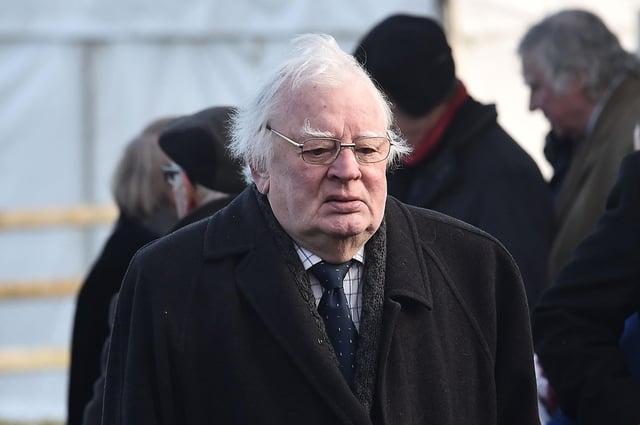
Austin Currie during The Funeral of Seamus Mallon at St James Church in Mullaghbrack, Co Armagh in 2020. Photo Colm Lenaghan/Pacemaker Press
His decision to squat at a council house in Caledon in June 1968 is widely seen as the beginning of the civil rights movement.
He was one of the founding members of the SDLP along with John Hume and Gerry Fitt.
In 1989, he won a seat in Dublin West for Fine Gael and pursued a career as TD and minister until he retired in 2002.
The family statement continued: “Our Daddy was wise, brave and loving and we thank him for the values that he lived by and instilled in us.
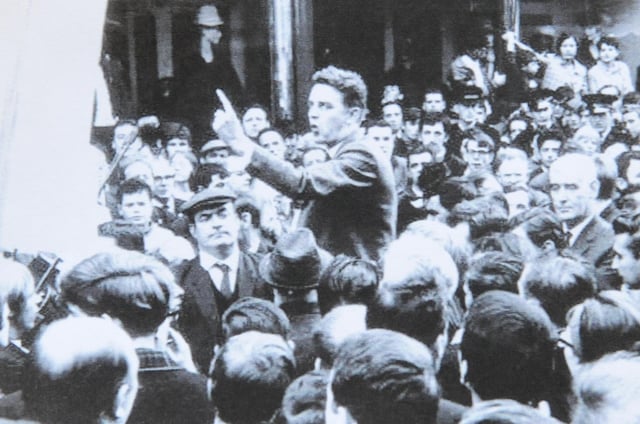
His decision to squat at a council house in Caledon in June 1968 is widely seen as the beginning of the civil rights movement.
He was one of the founding members of the SDLP along with John Hume and Gerry Fitt.
In 1989, he won a seat in Dublin West for Fine Gael and pursued a career as TD and minister until he retired in 2002.
The family statement continued: “Our Daddy was wise, brave and loving and we thank him for the values that he lived by and instilled in us.

Austin Currie addresses the crowd.
“He was our guiding star who put the principles of peace, social justice and equality first.
“From Edendork in county Tyrone to the bog of Allen, Daddy was most at home with his beloved Annita and his family, surrounded by newspapers and grandchildren.
“We will miss him deeply.”
SDLP leader Colum Eastwood said Mr Currie was a “titan” of the civil rights movement.
“He was our guiding star who put the principles of peace, social justice and equality first.
“From Edendork in county Tyrone to the bog of Allen, Daddy was most at home with his beloved Annita and his family, surrounded by newspapers and grandchildren.
“We will miss him deeply.”
SDLP leader Colum Eastwood said Mr Currie was a “titan” of the civil rights movement.
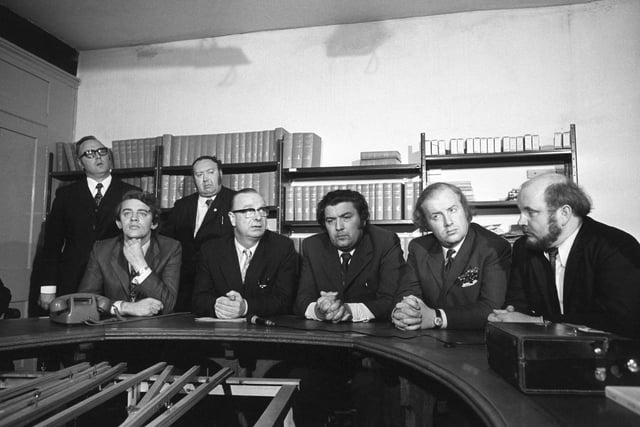
A Social Democratic and Labour Party press conference at the Tribine offices in Smithfield. (l-r) Austin Currie MP, Gerry Fitt MP, John Hume MP, Ivan Cooper MP and Paddy O'Hanlon. Behind them is Edward McGrady (left) and Paddy Devlin MP.
He added: “His housing protest in Caledon in 1968 was one of the key sparks for the civil rights campaign that followed and he spoke for a generation of young nationalists when he refused to allow his constituents to be treated as second class citizens anymore.
“His radical activism led him to join together with other young leaders and together they formed our party on the principles of a shared society where everyone got a fair shot at life, something so many of their contemporaries had been denied.
“Each time we lose a political giant like Austin we lose a piece of our history.
“While moments like this bring us great sadness, it also gives us the opportunity to celebrate the man and the huge contribution he made to politics in both the North and South of our island.”
Irish Taoiseach Micheal Martin described Austin Currie as a “peacemaker”.
Mr Martin tweeted: “Saddened to hear of the death of Austin Currie, one of the founding fathers of the civil rights movement in Northern Ireland.
He added: “His housing protest in Caledon in 1968 was one of the key sparks for the civil rights campaign that followed and he spoke for a generation of young nationalists when he refused to allow his constituents to be treated as second class citizens anymore.
“His radical activism led him to join together with other young leaders and together they formed our party on the principles of a shared society where everyone got a fair shot at life, something so many of their contemporaries had been denied.
“Each time we lose a political giant like Austin we lose a piece of our history.
“While moments like this bring us great sadness, it also gives us the opportunity to celebrate the man and the huge contribution he made to politics in both the North and South of our island.”
Irish Taoiseach Micheal Martin described Austin Currie as a “peacemaker”.
Mr Martin tweeted: “Saddened to hear of the death of Austin Currie, one of the founding fathers of the civil rights movement in Northern Ireland.
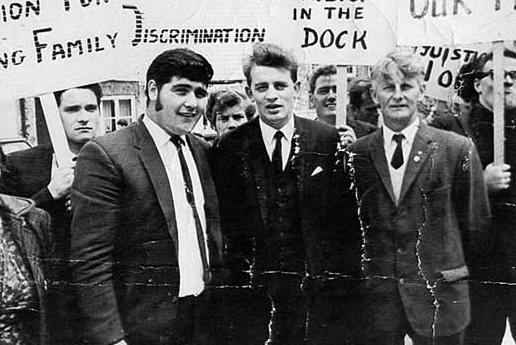
Austin Currie, centre, in protest mode.
“He did so much for people, as a peacemaker and in politics, serving in the Dail and as Minister of State with distinction.
“My sympathies to his family.”
Irish Tanaiste Leo Varadkar has described Austin Currie as one of the “outstanding politicians of his generation”.
Mr Varadkar said: “I am deeply saddened to hear of the death of Austin Currie, and extend my sympathies to his family.
“A pioneer of the civil rights movement in Northern Ireland, Austin was one of the outstanding politicians of his generation, highlighting discrimination against nationalists in issues like housing with a famous sit-in protest at Caledon.
“He helped to organise one of the first civil rights marches in Northern Ireland, and went on to co-found the Social Democratic & Labour Party with John Hume and Gerry Fitt.”
He added: “Austin moved his political career south of the border in the 1980s and became a Fine Gael TD in Dublin West, the constituency which I am currently honoured to represent alongside his daughter, Senator Emer Currie.
“He served as a minister for children’s affairs in the Rainbow Coalition under Taoiseach John Bruton, before retiring from politics in 2002.
“I knew Austin as a brave, courageous and principled man. He was blessed with extensive political insight and boundless humanity.
“Above all, he cared most about bringing peace to this island by peaceful means, something he worked towards throughout his political career, and was vehemently opposed to political violence.”
“He did so much for people, as a peacemaker and in politics, serving in the Dail and as Minister of State with distinction.
“My sympathies to his family.”
Irish Tanaiste Leo Varadkar has described Austin Currie as one of the “outstanding politicians of his generation”.
Mr Varadkar said: “I am deeply saddened to hear of the death of Austin Currie, and extend my sympathies to his family.
“A pioneer of the civil rights movement in Northern Ireland, Austin was one of the outstanding politicians of his generation, highlighting discrimination against nationalists in issues like housing with a famous sit-in protest at Caledon.
“He helped to organise one of the first civil rights marches in Northern Ireland, and went on to co-found the Social Democratic & Labour Party with John Hume and Gerry Fitt.”
He added: “Austin moved his political career south of the border in the 1980s and became a Fine Gael TD in Dublin West, the constituency which I am currently honoured to represent alongside his daughter, Senator Emer Currie.
“He served as a minister for children’s affairs in the Rainbow Coalition under Taoiseach John Bruton, before retiring from politics in 2002.
“I knew Austin as a brave, courageous and principled man. He was blessed with extensive political insight and boundless humanity.
“Above all, he cared most about bringing peace to this island by peaceful means, something he worked towards throughout his political career, and was vehemently opposed to political violence.”
Civil rights activist Austin Currie dies aged 82
Updated / Wednesday, 10 Nov 2021
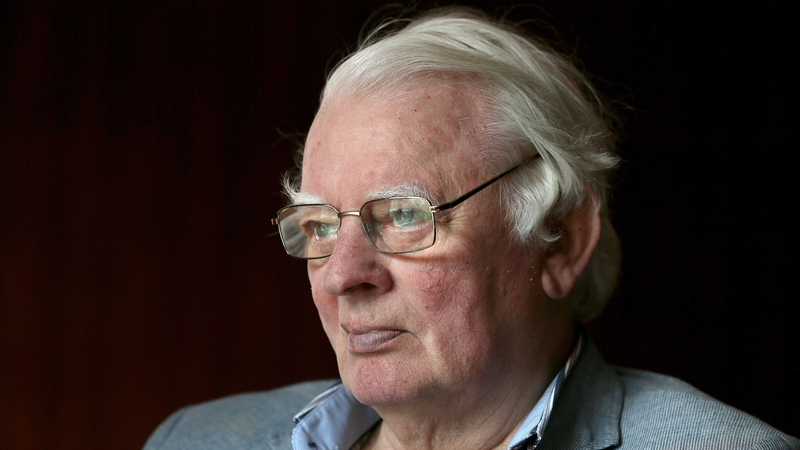

Austin Currie was a Stormont MP from 1964 until 1972 and became a TD in 1989
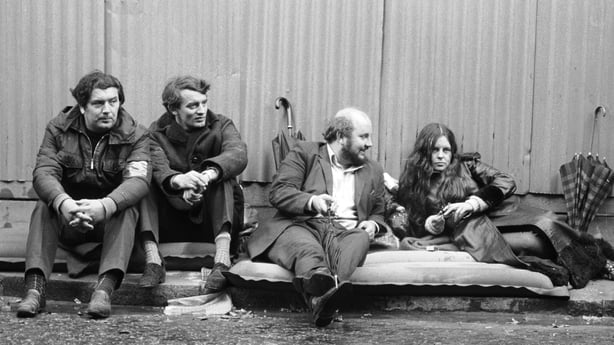
Austin Currie (2nd L) alongside John Hume, Paddy O'Hanlon and Bernadette Devlin
Updated / Wednesday, 10 Nov 2021

Austin Currie was a founding member of the SDLP in the 1970s
President President Michael D Higgins has led tributes to former Northern Ireland civil rights activist and Fine Gael TD Austin Currie, who has died aged 82.
President Higgins said Ireland has lost a "dedicated, sincere and very committed politician".
"His outstanding service to the people of this country as an advocate and politician will stand as his proud legacy. It was pleasure and privilege to have worked with him as a colleague in politics," President Higgins said.
"He will be remembered as a public representative who gave outstanding service to people of the island of Ireland over so many decades."
Mr Currie was also a founding member of the SDLP in the early 1970s.
He had a long political career and was one of the few elected to parliament on both sides of the border. He moved to Dublin in the 1980s and joined Fine Gael, running for president in 1990.
Mr Currie served as a minister of state in the rainbow coalition a few years later.
He is survived by his wife Annita and their five children, including their daughter Senator Emer Currie.
In a statement issued this evening, the Currie family said they were "heartbroken" by his death.
Born in Coalisland, Co Tyrone, he became the youngest MP elected to the parliament at Stormont at the age of 24 when he took a seat for the Nationalist party in East Tyrone.
Four years later in 1968, he was one of a group that occupied a house which had been allocated by the council to a young unmarried woman who was the secretary to a local Unionist politician.
It came at a time when there were 250 people on the housing waiting list and many Catholic families were living in overcrowded conditions.
President President Michael D Higgins has led tributes to former Northern Ireland civil rights activist and Fine Gael TD Austin Currie, who has died aged 82.
President Higgins said Ireland has lost a "dedicated, sincere and very committed politician".
"His outstanding service to the people of this country as an advocate and politician will stand as his proud legacy. It was pleasure and privilege to have worked with him as a colleague in politics," President Higgins said.
"He will be remembered as a public representative who gave outstanding service to people of the island of Ireland over so many decades."
Mr Currie was also a founding member of the SDLP in the early 1970s.
He had a long political career and was one of the few elected to parliament on both sides of the border. He moved to Dublin in the 1980s and joined Fine Gael, running for president in 1990.
Mr Currie served as a minister of state in the rainbow coalition a few years later.
He is survived by his wife Annita and their five children, including their daughter Senator Emer Currie.
In a statement issued this evening, the Currie family said they were "heartbroken" by his death.
Born in Coalisland, Co Tyrone, he became the youngest MP elected to the parliament at Stormont at the age of 24 when he took a seat for the Nationalist party in East Tyrone.
Four years later in 1968, he was one of a group that occupied a house which had been allocated by the council to a young unmarried woman who was the secretary to a local Unionist politician.
It came at a time when there were 250 people on the housing waiting list and many Catholic families were living in overcrowded conditions.

Austin Currie was a Stormont MP from 1964 until 1972 and became a TD in 1989
(Pic: RTÉ Stills Library)
In 1970, Mr Currie was one of the founding members of the SDLP with John Hume, Ivan Cooper, Gerry Fitt, Paddy Devlin and Paddy O'Hanlon. He went on to serve as the Minister for Housing in Northern Ireland's first powersharing executive in 1974.
He contested Westminster elections in Fermanagh-South Tyrone in 1979 and 1986 and was elected to represent that constituency in the Northern Ireland Assembly in 1982.
In 1989, he moved south after winning a seat in Dublin West in that year's General Election. In 1990, he was Fine Gael's candidate for the President. He came third behind Fianna Fáil's Brian Lenihan and winner Mary Robinson.
During the Fine Gael-led rainbow coalition government from 1994 to 1997 he was minister of state at the Departments of Education, Justice and Health.
He lost his Dáil seat at the 2002 General Election and retired from electoral politics.
The Currie family said: "After a long and eventful life, he died peacefully in his sleep at his home in Derrymullen, Co Kildare. He had just celebrated his 82nd birthday.
"Austin was married to Annita for 53 years. They were a formidable team whose love for each other and their family saw them through some of the worst times in Northern Ireland's recent history.
"Austin, who was born in Co Tyrone, was the eldest of eleven children. His decision to squat a council house in Caledon in June 1968 is widely seen as the beginning of the Civil Rights Movement.
Read more
Currie highlights importance of civil rights movement
"One of the founding members of the SDLP along with John Hume and Gerry Fitt, Austin played a key role in the politics of that era.
"In 1989, he won a seat in Dublin West for Fine Gael and pursued a successful career as TD and minister until retirement in 2002.
"Our Daddy was wise, brave and loving and we thank him for the values that he lived by and instilled in us. He was our guiding star who put the principles of peace, social justice and equality first.
"From Edendork in county Tyrone to the bog of Allen, Daddy was most at home with his beloved Annita and his family, surrounded by newspapers and grandchildren. We will miss him deeply."
In 1970, Mr Currie was one of the founding members of the SDLP with John Hume, Ivan Cooper, Gerry Fitt, Paddy Devlin and Paddy O'Hanlon. He went on to serve as the Minister for Housing in Northern Ireland's first powersharing executive in 1974.
He contested Westminster elections in Fermanagh-South Tyrone in 1979 and 1986 and was elected to represent that constituency in the Northern Ireland Assembly in 1982.
In 1989, he moved south after winning a seat in Dublin West in that year's General Election. In 1990, he was Fine Gael's candidate for the President. He came third behind Fianna Fáil's Brian Lenihan and winner Mary Robinson.
During the Fine Gael-led rainbow coalition government from 1994 to 1997 he was minister of state at the Departments of Education, Justice and Health.
He lost his Dáil seat at the 2002 General Election and retired from electoral politics.
The Currie family said: "After a long and eventful life, he died peacefully in his sleep at his home in Derrymullen, Co Kildare. He had just celebrated his 82nd birthday.
"Austin was married to Annita for 53 years. They were a formidable team whose love for each other and their family saw them through some of the worst times in Northern Ireland's recent history.
"Austin, who was born in Co Tyrone, was the eldest of eleven children. His decision to squat a council house in Caledon in June 1968 is widely seen as the beginning of the Civil Rights Movement.
Read more
Currie highlights importance of civil rights movement
"One of the founding members of the SDLP along with John Hume and Gerry Fitt, Austin played a key role in the politics of that era.
"In 1989, he won a seat in Dublin West for Fine Gael and pursued a successful career as TD and minister until retirement in 2002.
"Our Daddy was wise, brave and loving and we thank him for the values that he lived by and instilled in us. He was our guiding star who put the principles of peace, social justice and equality first.
"From Edendork in county Tyrone to the bog of Allen, Daddy was most at home with his beloved Annita and his family, surrounded by newspapers and grandchildren. We will miss him deeply."

Austin Currie (2nd L) alongside John Hume, Paddy O'Hanlon and Bernadette Devlin
at a protest outside Downing Street in 1971
SDLP Leader Colum Eastwood has paid tribute to Mr Currie, describing him as a "titan of the civil rights movement".
He added: "His housing protest in Caledon in 1968 was one of the key sparks for the civil rights campaign that followed and he spoke for a generation of young nationalists when he refused to allow his constituents to be treated as second class citizens anymore.
"Each time we lose a political giant like Austin we lose a piece of our history. While moments like this bring us great sadness, it also gives us the opportunity to celebrate the man and the huge contribution he made to politics in both the North and South of our island.
"It's because of brave men and women like Austin who saw the way their community was being treated and refused to be silenced, that we all enjoy the freedoms and privileges we have today."
Taoiseach Micheál Martin paid tribute to Mr Currie, saying he was "one of the founding fathers of the civil rights movement in Northern Ireland".
Tánaiste and Fine Gael leader Leo Varadkar described him as "one of the outstanding politicians of his generation".
Mr Varadkar added: "I knew Austin as a brave, courageous, and principled man. He was blessed with extensive political insight and boundless humanity.
"Above all, he cared most about bringing peace to this island by peaceful means, something he worked towards throughout his political career, and was vehemently opposed to political violence.
"My thoughts are today with his family, and his extensive circle of friends and acquaintances."
Minister for Foreign Affairs Simon Coveney said he was "a man of extraordinary generosity & conviction, he campaigned for social justice, equality and peace all his life, North and South. Sincere condolences to his family".
Chair of the John and Pat Hume Foundation Dr Seán Farren said Mr Austin was a "true giant of civil rights and constitutional politics".
"He was a courageous leader who dedicated his political life to non-violent peaceful change.
"He was a pioneer in the movement for civil rights. His decision to lead a sit-in at a house in Caledon to highlight discrimination in housing allocation by Dungannon Council was a key moment in the movement's campaign to achieve fairness and civil rights for all."
SDLP Leader Colum Eastwood has paid tribute to Mr Currie, describing him as a "titan of the civil rights movement".
He added: "His housing protest in Caledon in 1968 was one of the key sparks for the civil rights campaign that followed and he spoke for a generation of young nationalists when he refused to allow his constituents to be treated as second class citizens anymore.
"Each time we lose a political giant like Austin we lose a piece of our history. While moments like this bring us great sadness, it also gives us the opportunity to celebrate the man and the huge contribution he made to politics in both the North and South of our island.
"It's because of brave men and women like Austin who saw the way their community was being treated and refused to be silenced, that we all enjoy the freedoms and privileges we have today."
Taoiseach Micheál Martin paid tribute to Mr Currie, saying he was "one of the founding fathers of the civil rights movement in Northern Ireland".
Tánaiste and Fine Gael leader Leo Varadkar described him as "one of the outstanding politicians of his generation".
Mr Varadkar added: "I knew Austin as a brave, courageous, and principled man. He was blessed with extensive political insight and boundless humanity.
"Above all, he cared most about bringing peace to this island by peaceful means, something he worked towards throughout his political career, and was vehemently opposed to political violence.
"My thoughts are today with his family, and his extensive circle of friends and acquaintances."
Minister for Foreign Affairs Simon Coveney said he was "a man of extraordinary generosity & conviction, he campaigned for social justice, equality and peace all his life, North and South. Sincere condolences to his family".
Chair of the John and Pat Hume Foundation Dr Seán Farren said Mr Austin was a "true giant of civil rights and constitutional politics".
"He was a courageous leader who dedicated his political life to non-violent peaceful change.
"He was a pioneer in the movement for civil rights. His decision to lead a sit-in at a house in Caledon to highlight discrimination in housing allocation by Dungannon Council was a key moment in the movement's campaign to achieve fairness and civil rights for all."
No comments:
Post a Comment